Past Seminars
Targeting Mitochondrial Dysfunction Following Traumatic CNS Injury; A “MITONEET” Approach
Dr. Patrick Sullivan
November 17, 2017
Coverdell Center
University of Georgia, Athens, GA
Patrick Sullivan, also a Research Physiologist at Lexington VAMC, received his undergraduate degree in biology and doctoral degree in anatomy and neurobiology from the University of Kentucky. Dr. Sullivan completed a postdoctoral fellowship at The Reeve-Irvine Research Center at the University of California at Irvine. Dr. Sullivan has published over 100 peer-reviewed manuscripts and has calculated a h-index of 48 and has had continual external funding since 2002. Dr. Sullivan’s areas of research include the role of mitochondrial dysfunction in the neuropathology of acute brain and spinal cord injury, mitochondrial aging and the CNS, and mitochondrial bioenergetics.
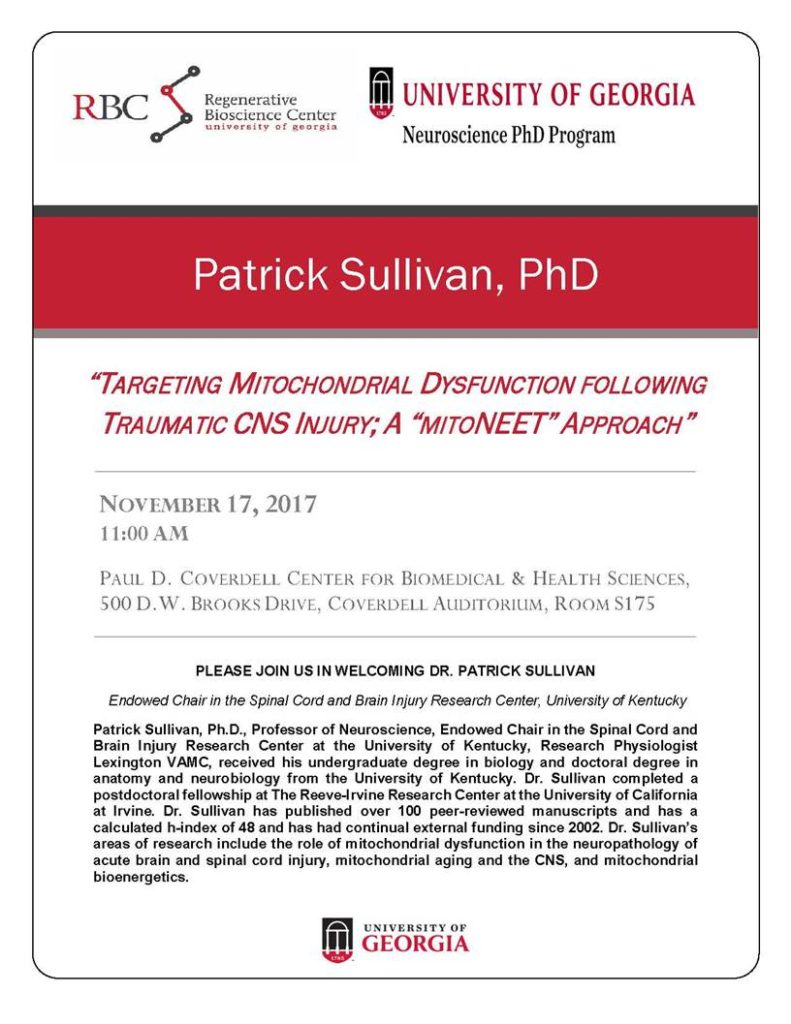
Characterizing the neuroanatomy of psychosocial stress-induced drug seeking in rats: can we use DREADDs?
Daniel F. Manvich, Ph.D.
November 1, 2017
Coverdell Center
University of Georgia, Athens, GA
Dr. Daniel F. Manvich received his B.A. in Biopsychology from Tufts University in 2003 and his Ph.D. in Neuroscience from Emory University in 2011. Since 2011, Manvich has been a postdoctoral research fellow in the Department of Human Genetics at Emory University. His primary research program has focused on better understanding the interplay between stress and substance abuse. More specifically, Manvich employs rodent models of drug use and relapse with the goal of identifying the neuroanatomical substrates and/or behavioral traits that contribute to stress-triggered cocaine seeking.
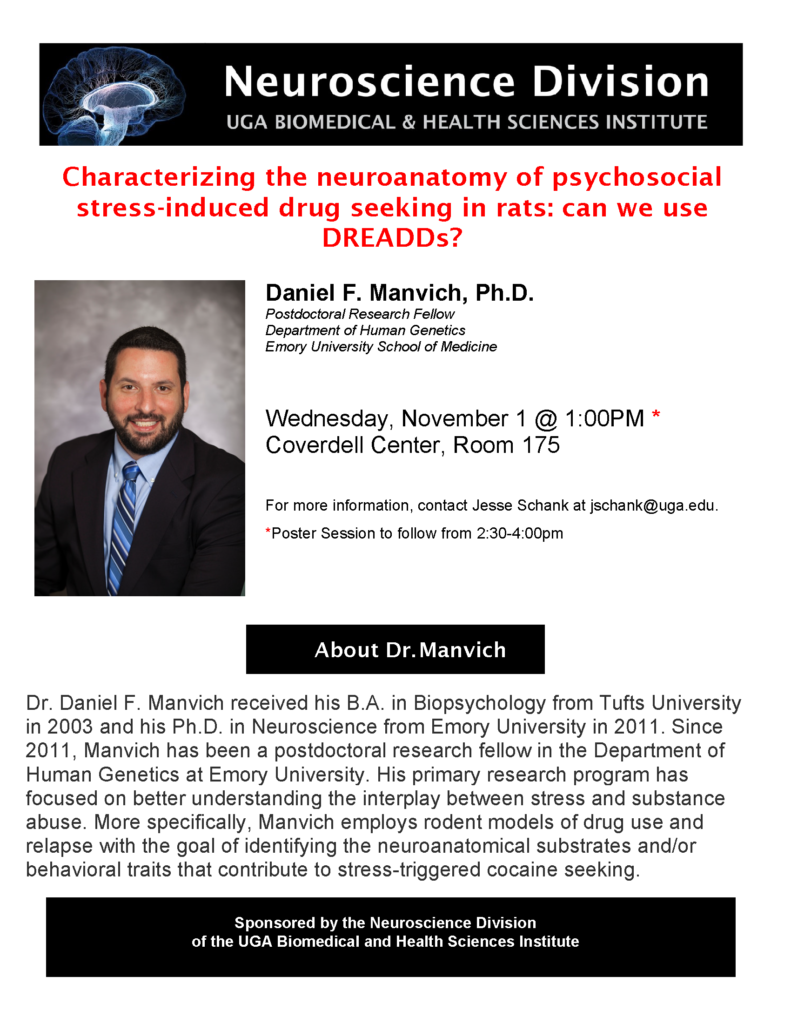
Neurodevelopmental Effects of Adverse Caregiving in Primates: Emotional and Stress Regulation
Mar Sanchez, PhD
October 4, 2017
Coverdell Center
University of Georgia, Athens, GA
Dr. Sanchez received her Ph.D. in Neurobiology and Cell Biology from the Complutense University of Madrid, Spain and has expertise in stress neurobiology and behavioral neuroscience. Her lab studies the neurobiology of stress and emotional regulation during development, using nonhuman primate models. The main focus of her research program is to understand how early life stress (in particular, alterations in maternal care) affects the development of brain circuits that control emotional and stress reactivity from infancy through adolescence, leading to psychopathology and pathophysiology characteristic of anxiety and mood disorders. These brain systems include prefrontal-amygdala circuits. She uses a multidisciplinary approach, including analysis of neuroendocrine stress systems, social and emotional behavior and brain development using in vivo neuroimaging techniques (MRI, DTI, PET and resting state fMRI) and in vitro assays of brain neuropeptide and corticosteroid systems. She has established a successful research program, supported by NIH and NSF funding and by awards from private foundations (e.g. NARSAD, ASF and KTGF). Current awards include R01 grants from NIH/NICHD and NIH/NIDA and is co-PI in a project part of the Emory Autism Center of Excellence. Dr. Sanchez’s multidisciplinary and translational research bridges different disciplines and strong collaborations with clinical and basic researchers that study human developmental psychobiology, psychopathology, behavioral genetics/epigenetics and psychoneuroimmunology at Emory and other universities (Minnesota, Madison-Wisconsin, Maryland, OHSU, Pittsburgh, NYU, UNC) and the NIH. She is a member of the NIH CSR Biobehavioral Regulation, Learning and Ethology (BRLE) Study Section and serves in the editorial board of several journals, including Psychoneuroendoendocrinology and Development and Psychopathology.
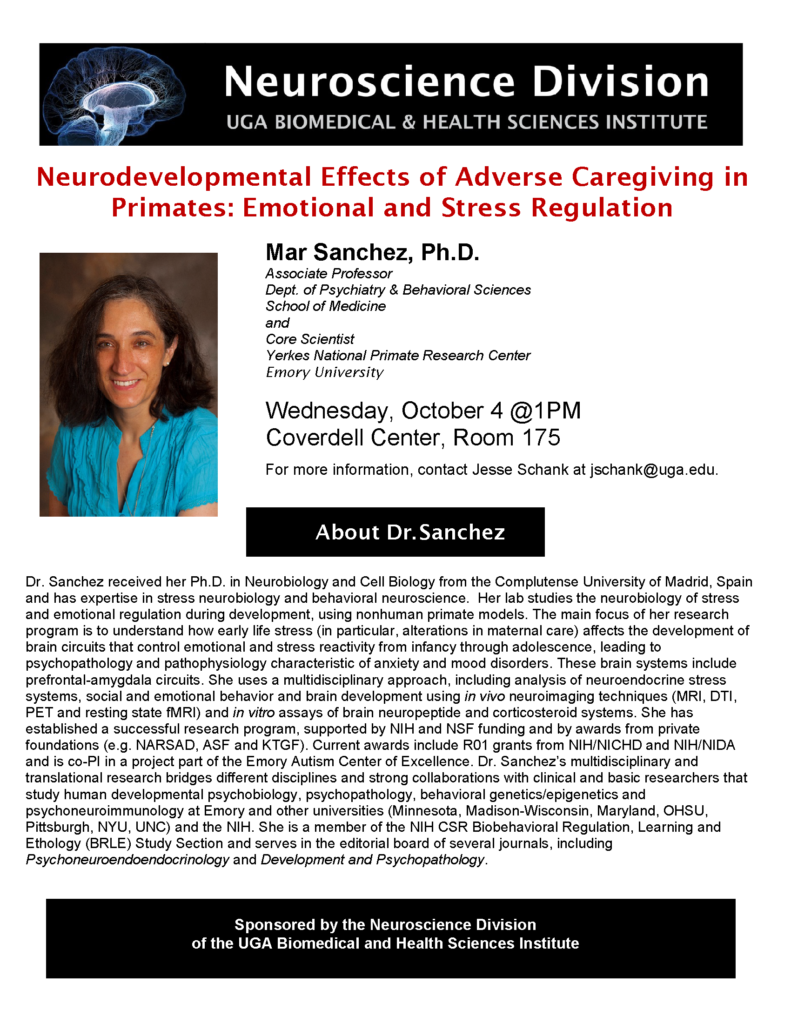
Roles of Neuropeptide Y and Dopamine Systems in Loser Mentality and Long-lasting Depressive-like Behaviors in Male Drosophila
Yong-Kyu Kim, PhD
September 6, 2017
Coverdell Center
University of Georgia, Athens, GA
This seminar investigated behavior genetics, evolutionary biology and neuroscience, and includes pre- and post-mating isolation mechanisms in speciation, mate choice and offspring viability, and social learning and memory. Studies on social experience in Drosophila behaviors have extended his research to human behaviors such as aggression that is prevalent among animals, including fruit flies, and he has investigated the consequences of fighting experience, especially losing fights on the expression of internal state and behavior, as well as its neural circuits in Drosophila. Dr. Kim has played major roles for the proposed research by designing and performing experiments, and by supervising lab personnel, including undergraduates participated in the projects. In addition, he successfully collaborated with other researchers and produced several peer-reviewed publications from each project.
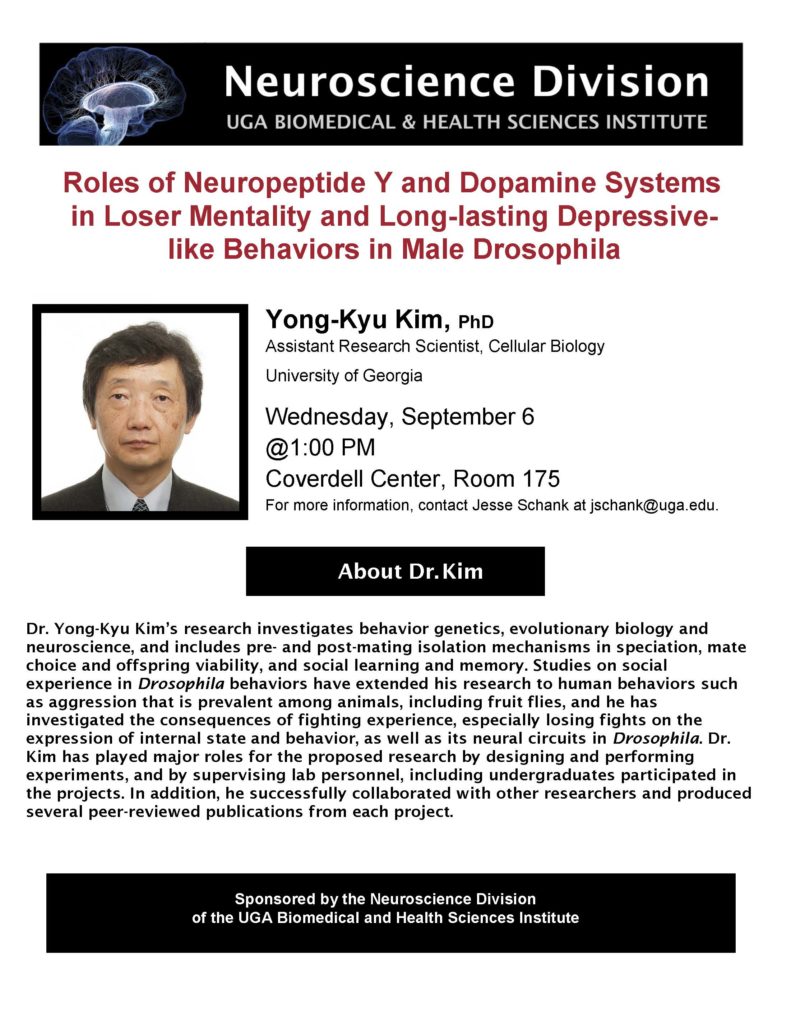
Memory and ingestive behavior: A vicious cycle?
Marise Parent, PhD
May 3, 2017
Coverdell Center
University of Georgia, Athens, GA
Marise Parent is Professor of Neuroscience and Psychology at Georgia State University (GSU). She is a member of the GSU Center for Behavioral Neuroscience and the GSU Center for Obesity Reversal and serves as Associate Director of the Neuroscience Institute and Faculty Associate for Honors and Theses in the GSU Honors College. She obtained a Bachelor of Arts in Psychology from Concordia University in Montreal, Canada, a Ph.D. in Biological Sciences with a specialization in neurobiology and behavior from the University of California, Irvine, and postdoctoral training in the Department of Psychology and Neuroscience Program at the University of Virginia. Before joining GSU she was an Assistant Professor in the Department of Psychology at the University of Alberta in Edmonton, Canada. In 2010 and 2011, she served as a Program Officer in the Biology Directorate at the National Science Foundation.
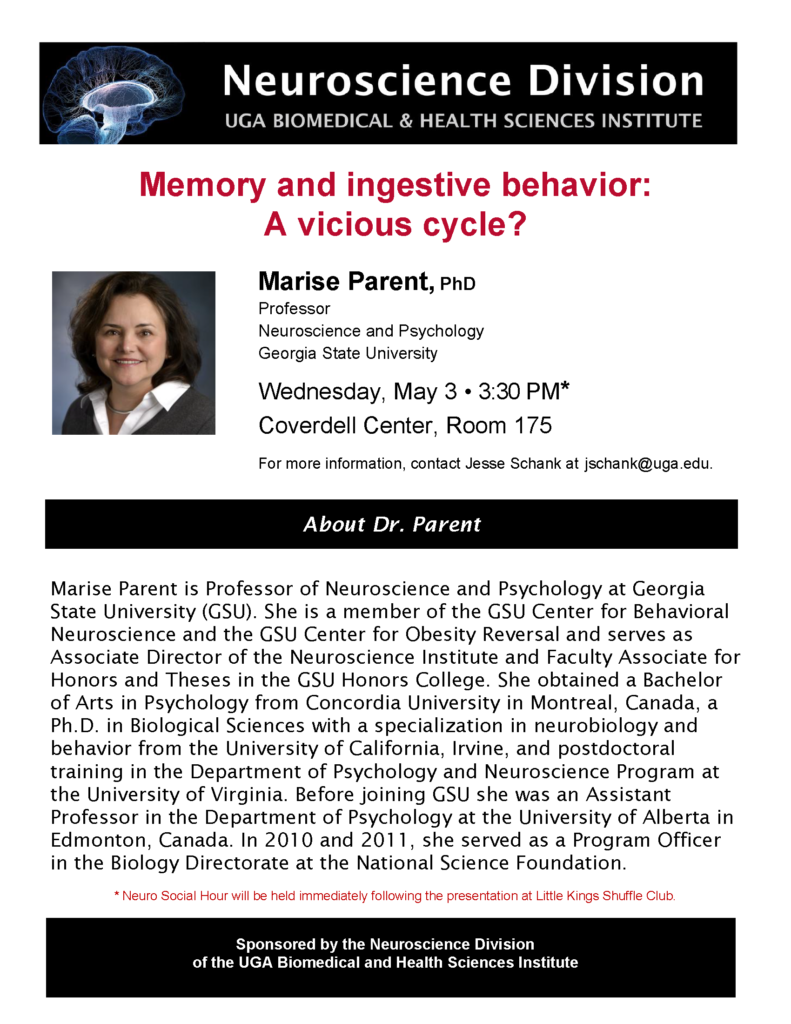
Development of visuomotor behaviors and brain-wide connectivity in zebrafish
Albert Pan, PhD
April 5, 2017
Coverdell Center
University of Georgia, Athens, GA
Dr. Albert Pan is Assistant Professor in the Department of Neuroscience and Regenerative Medicine at Augusta University (formerly the Medical College of Georgia) in Augusta, Georgia. He received his Ph.D degree in Developmental Biology from Washington University School of Medicine and postdoctoral training from Harvard University. His laboratory uses zebrafish, a small and transparent fish, to understand how complex connectivity patterns between nerve cells in the brain are established during development. This process is critical for both normal brain function and neuropsychiatric diseases. Pan is also interested in developing new imaging and labeling technologies for visualizing anatomy, development, and regeneration. Ongoing work in his lab includes new models for saccade initiation failure (ocular motor apraxia) and brain-wide connectivity analysis of zebrafish disease models.
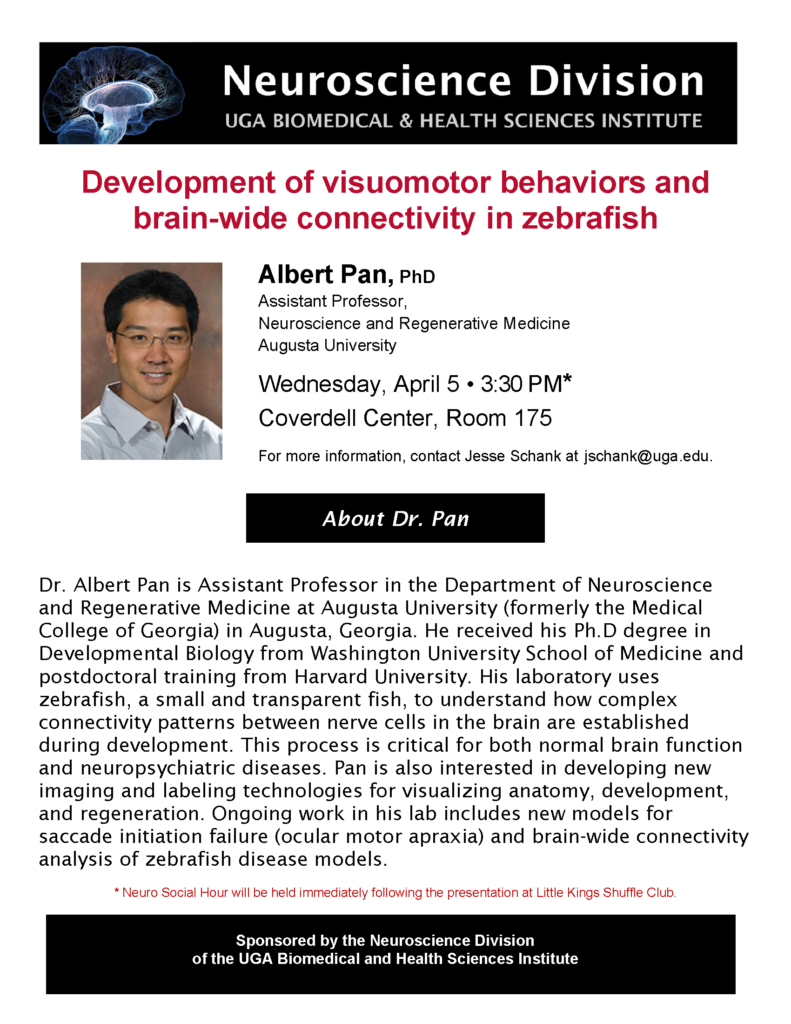
Translational approaches for understanding stress-induced neuroadaptations and adverse behavioral outcomes in non-human primates
Vasiliki Michopoulos, PhD
March 1, 2017
Coverdell Center
University of Georgia, Athens, GA
Dr. Michopoulos’ research investigates how psychosocial stress
exposure across the lifespan adversely affects behavior and physiology
using a translational neuroscience approach across non-human
primates and humans in a sex-specific manner. Her research is
committed to studying women’s health by focusing broadly on how
adverse social experience influences physiology, behavior, brain
processes, and the emergence of psychopathology through changes in
neuroendocrine and inflammatory signaling.
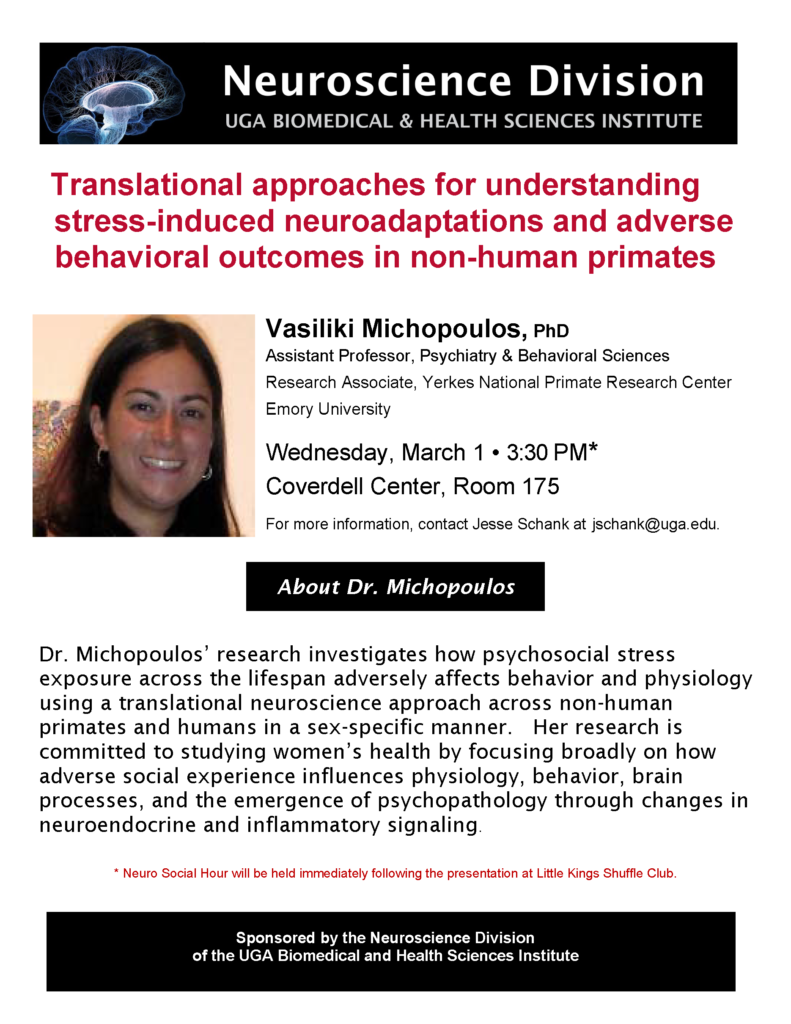
Role of noradrenergic mechanisms in ethinyl-estradiol effects on cognition in rats
Philip Holmes. PhD
February 1, 2017
Coverdell Center
University of Georgia, Athens, GA
The Holmes laboratory at UGA studies neurotransmitter abnormalities in rodent models of stress, anxiety, and depression. Recently, he has been examining the neurobiological basis for stress resilience with particular focus on the beneficial effects of exercise on neural plasticity. Other research projects examine the impact of synthetic hormones on cognitive functions in rats and the potential
benefits of lutein supplementation for promoting mental health in humans.
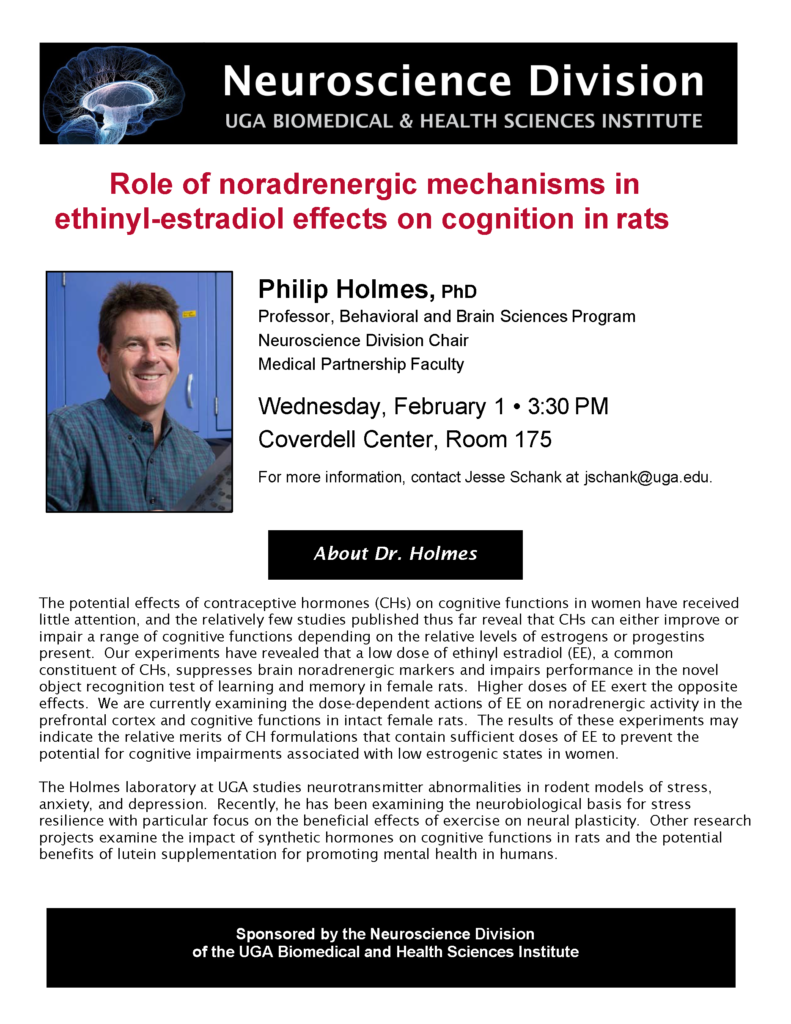
Reorganizing Spinal Synapses after Nerve Injury and Regeneration
Tim Cope, PhD
November 3, 2016
Coverdell Center
University of Georgia, Athens, GA
My research interests center on control of movement by sensorimotor integration in the mammalian spinal cord. Using predominantly electrophysiological methods applied in vivo, we study neural signaling by spinal motoneurons, somatosensory neurons, and their central synapses. Our primary analyses include electrical properties, synaptic function, and firing behavior of single neurons. We are actively examining how these neurons and synapses respond soon and long after peripheral nerve injury and regeneration. Our recent
findings demonstrate that successful regeneration of damaged sensory axons does not prevent complex reorganization of their synaptic connections made within the spinal cord. In separate studies, we are examining novel mechanisms of sensory encoding and their impairment which recently discovered in rodents treated with anti-cancer drugs. Both nerve regeneration and chemotherapy projects are driven by the long-term goal of accurately identifying the neural mechanisms behind movement disorders. We also continue to explore
fundamental operations of the normal adult nervous system. Our most recent studies focus on synaptic modulation of motoneuron firing and on interspecies comparisons of spinal circuits.
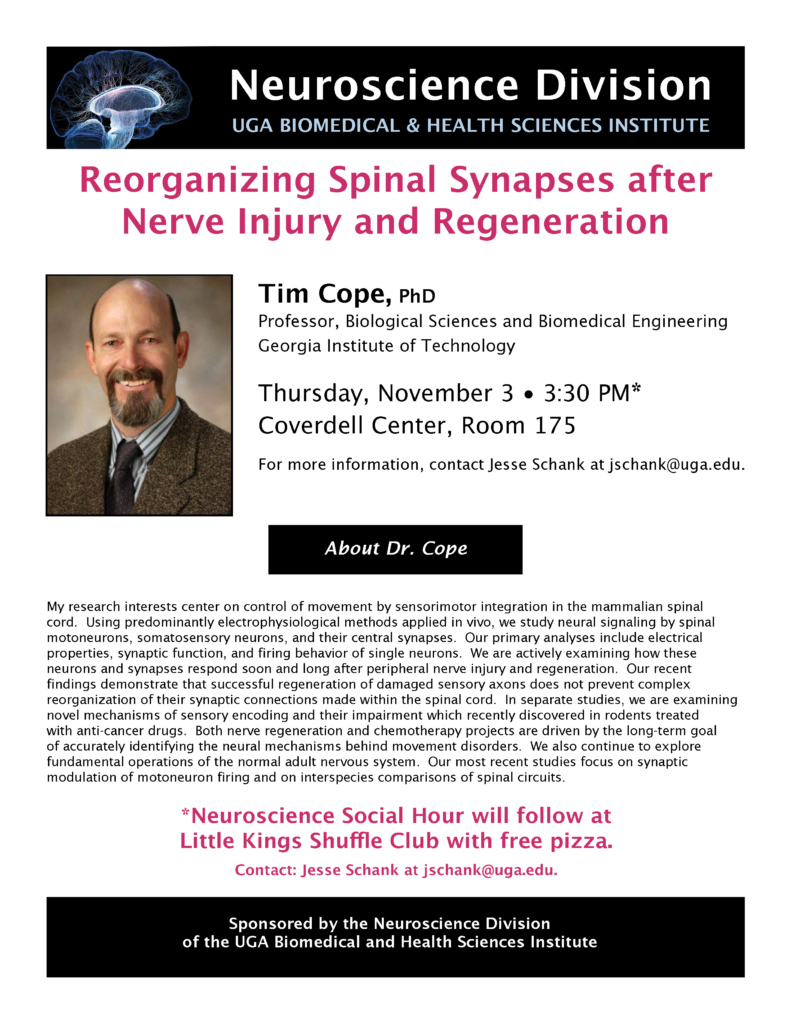
Mechanistic understanding of brain development and brain disorder
Jian-Fu “Jeff” Chen, PhD
September 1, 2016
Coverdell Center
University of Georgia, Athens, GA
The Chen lab has a general interest in neural development and neurodegeneration. Chen asks how neural progenitor cells (NPCs) balance self-renewal and differentiation, and how neurons are formed and maintained. He uses cellular, molecular and biochemical approaches to study these questions in the context of normal brain development and neurological disorders.
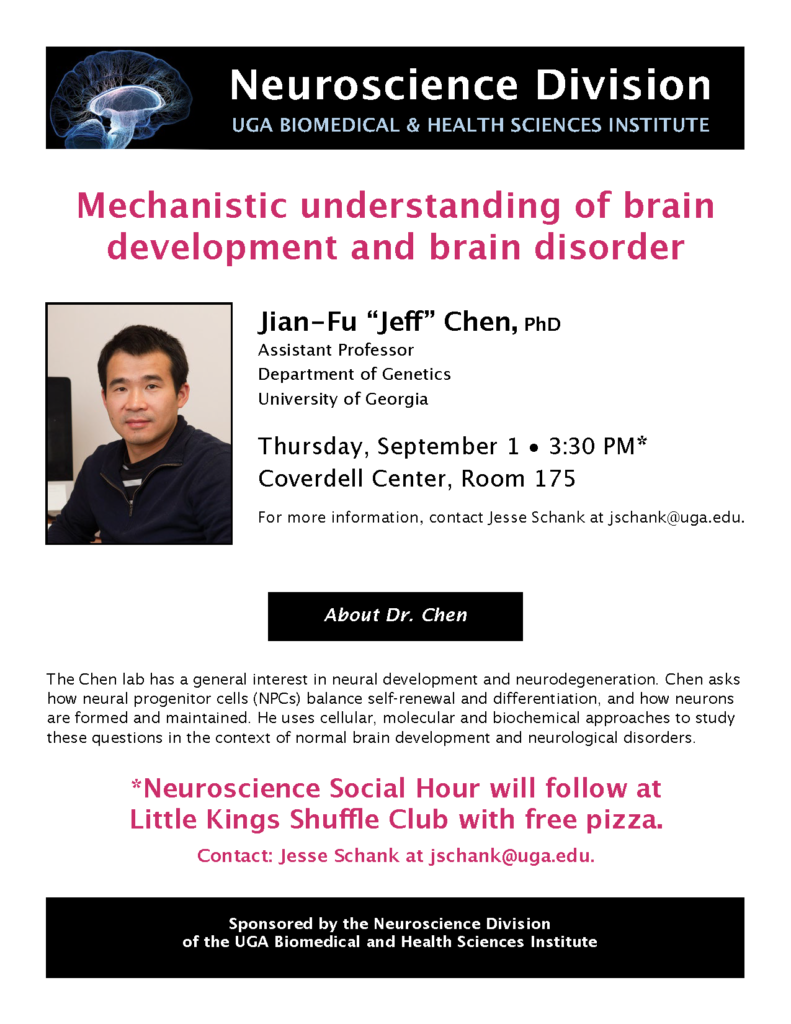
Inflammation effects on dopamine, reward circuitry and motivation
Jennifer Felger, PhD
April 7, 2016
Coverdell Center
University of Georgia, Athens, GA
Dr. Felger studies the effects of inflammatory cytokines on neurotransmitters and neural circuits as they relate to behavioral change. She received a B.S. in Psychology from the University of Florida (2001), a PhD in Neuroscience
from Emory (2007), and then continued her training in neuroscience and immunology as a postdoctoral fellow in the Laboratory of Neuroendocrinology at Rockefeller University (2007-2009). Dr. Felger then returned to
Emory and her NRSA-funded postdoctoral work established that peripheral administration of the inflammatory cytokine interferon-alpha decreases basal ganglia dopamine, as assessed in a translational model of cytokineinduced
depressive and anhedonic behavior. Dr. Felger is currently exploring the role of dopamine in alterations in neurocircuitry associated with increased inflammation in patients with major depression using fMRI, and
continuing her translational work to better understand the underlying neural and metabolic pathways by which inflammation may affect neurotransmitters. She also collaborates with researchers in the Winship Cancer Institute and School of Nursing to examine molecular and cellular pathways of immune activation in cancer patients who experience behavioral change in response to treatment.
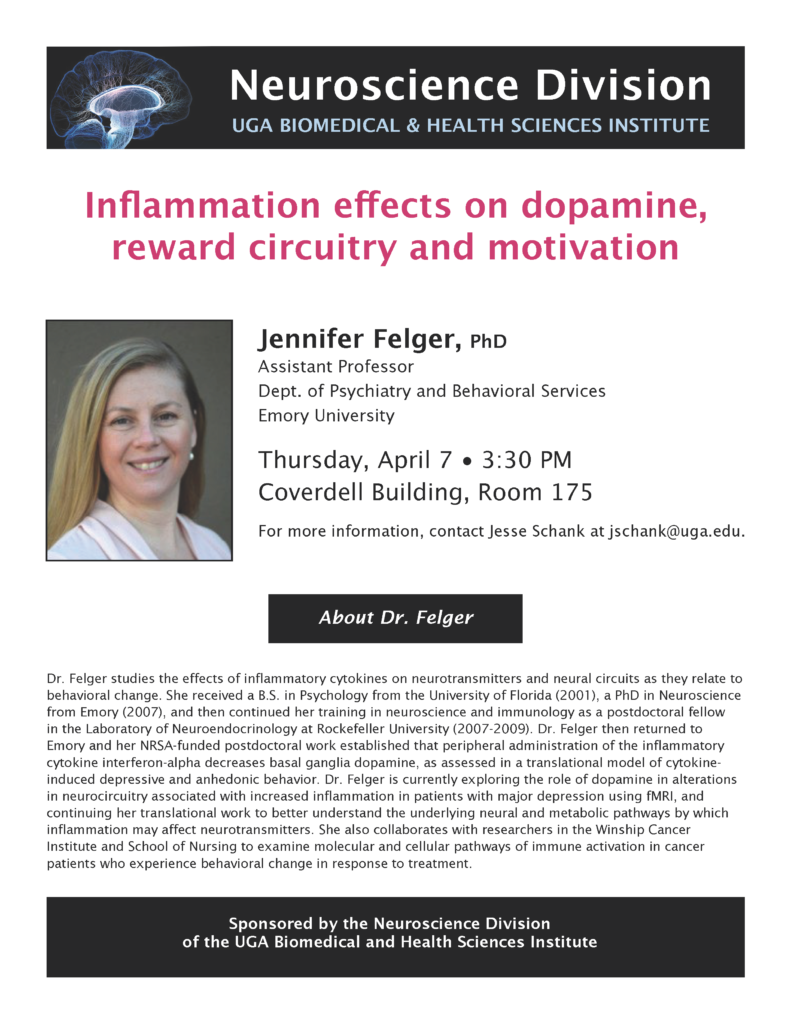
Ancestral remembrances and descendant recollections – a multi-generational perspective on structure and function in the nervous system
Brian Dias, PhD
March 3, 2016
Coverdell Center
University of Georgia, Athens, GA
Brian Dias grew up in India and obtained an MSc from the Tata Institute of Fundamental Research (TIFR) studying the neurobiology underlying antidepressant treatments and stress in rats. Wanting to conduct field-work and be “outside”, he pursued a PhD at UT-Austin studying sexual behavior in lizards. Motivated by his desire to query the genetic basis of behavior he then transitioned to working on courtship behavior in the fruitfly at HHMI-Janelia
Farm Research Campus, before moving to Emory to study the neurobiological mechanisms underlying fear in the mouse. His work has been covered extensively by scientific (Nature News and Views, Feature in Nature) and popular media (e.g. National Geographic, BBC, listed as one of the Top 10 Scientific Discoveries of 2014 by La Recherche). In addition to his research, Brian is a Neuroscience Faculty Member of the Emory-Tibet Science Initiative and has been teaching Neuroscience to Tibetan Buddhist monks since 2013.
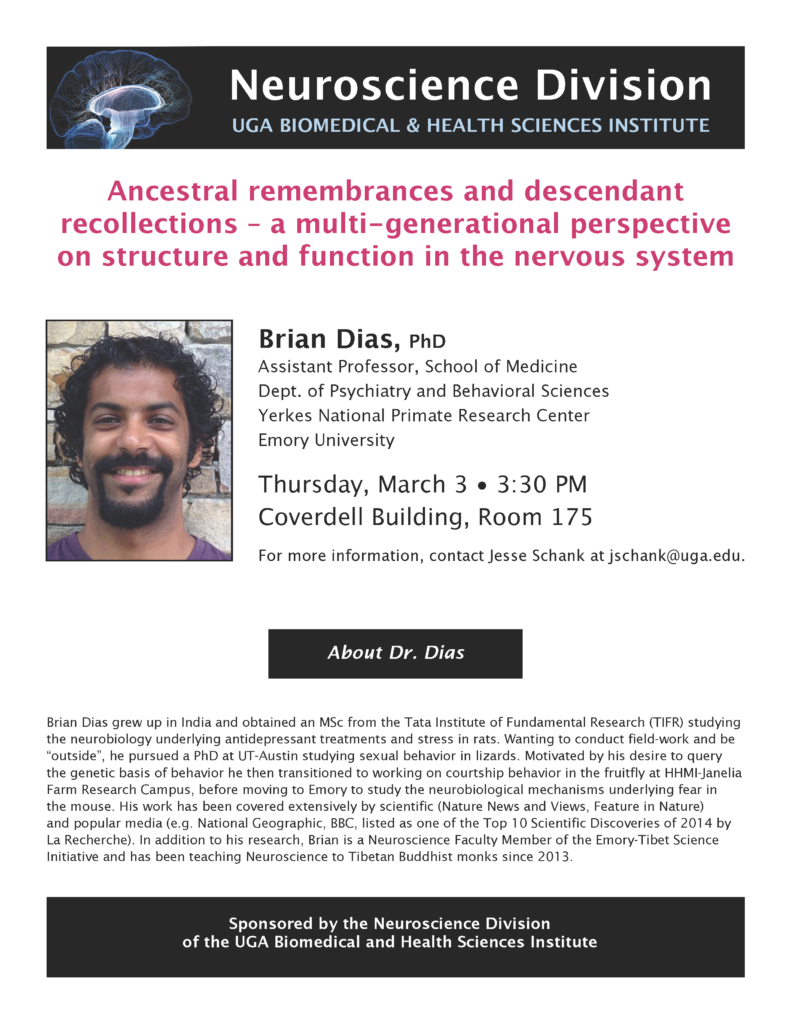
Magnetic Resonance Spectroscopy of Brain Metabolism of Glucose, Acetate, and Ethanol
Graeme Mason, PhD
December 3, 2015
Coverdell Center
University of Georgia, Athens, GA
Dr. Graeme F. Mason develops experimental models and methods for studies of brain metabolism using 1H and 13C nuclear magnetic resonance (NMR) and mass spectrometry in conjunction with 13C isotopic labeling in vivo, in cell preparations, and other systems. His work began during his graduate studies at Yale where he used a rat model for the experimental determination of brain glucose transport kinetics, energetics, and neurotransmitter metabolism. Dr.
Mason received further training at the University of Alabama at Birmingham, where he guided the group’s 13C-labeling studies of the human brain in vivo in the 4.1T whole-body MR system. Dr. Mason currently studies metabolism and neurotransmission in the brain in vivo, including effects of psychiatric disorders and substances such as alcohol and nicotine. Dr. Mason examines healthy subjects and patients to investigate relationships among GABA, glutamate, and glutamine concentrations and their rates of synthesis and release in the brain, in particular with regard to effects of alcohol with acute and chronic use.
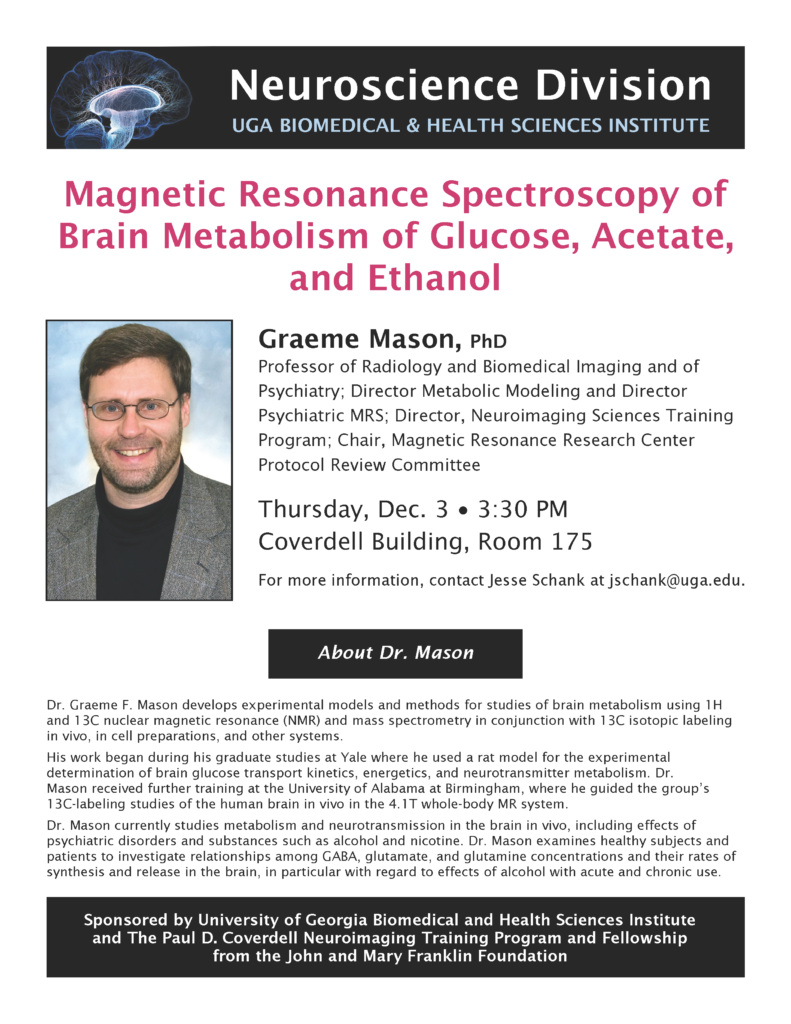
Toggling between actions and habits: Cortical regulators and the influence
of cocaine
Shannon Gourley, PhD
November 5, 2015
Coverdell Center
University of Georgia, Athens, GA
Dr. Gourley’s research team focuses on issues of depression and addiction. Specifically, her team aims to understand why adolescent-emergent depression is associated with insensitivity to traditional antidepressants, and why exposure to drugs of abuse during adolescence is associated with drug abuse and dependence that persist across the lifespan. She hypothesizes these adverse outcomes may relate to the manner in which pathological stimuli, such as stressors, social isolation and drugs of abuse, impact the adolescent prefrontal cortex. Across mammalian species, this brain region organizes complex decision-making, reward valuation and inhibitory control, and it also undergoes considerable remodeling and development during adolescence. Dr. Gourley’s team uses behavioral, pharmacological, biochemical, genetic and cellular approaches to develop and optimize novel therapeutic interventions for vulnerable adolescent populations. Conversely, her research team also aims to better understand the neurobiological mechanisms of resilience to stressors and drugs of
abuse at any age. Dr. Gourley completed her doctoral and postdoctoral training at Yale University. Her early independent research at Emory was supported by an Emory Egleston Children’s Research Center fellowship, and she was named the Katherine Deschner Family NARSAD Investigator for 2012-14. The Gourley lab is supported by the National Institute on Mental Health as part of the BRAINS (Biobehavioral Research Award for Innovative New Scientists) initiative, as well as the National Institute on Drug Abuse.
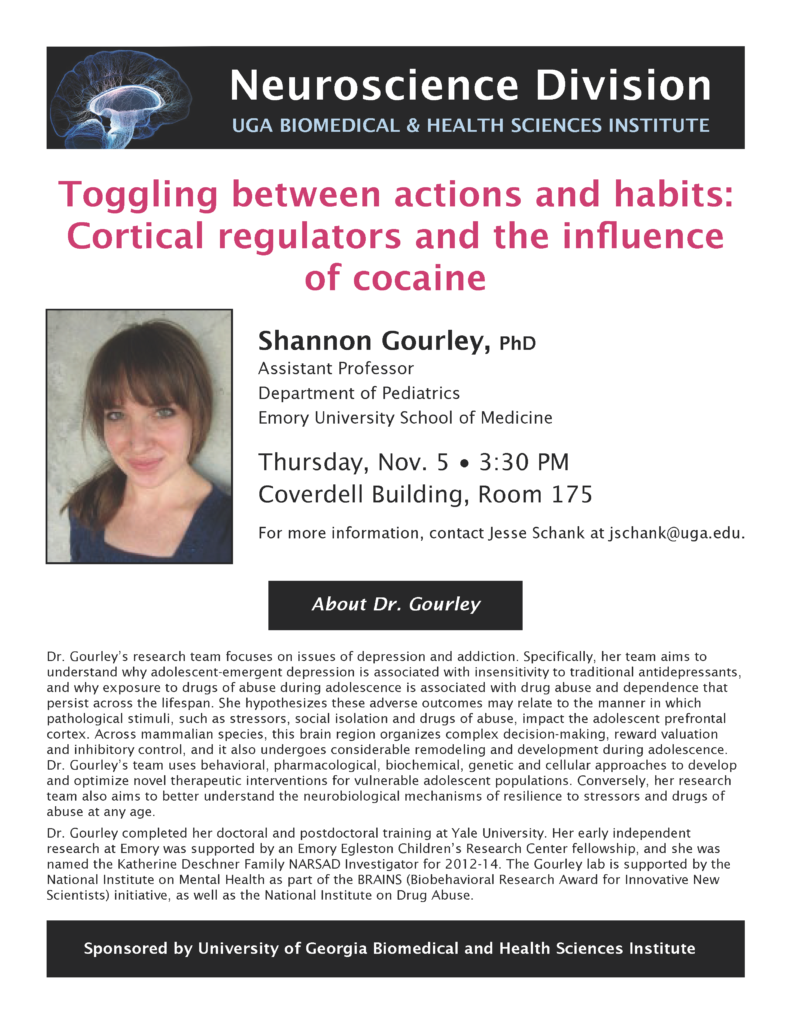
The Evolution of Swimming Behaviors and their Neural Circuits in Nudibranch Sea Slugs
Paul Katz, PhD
May 7, 2015
Coverdell Center
University of Georgia, Athens, GA
Paul S Katz graduated from Northwestern University in 1982 and received his PhD in 1989 from Cornell University, where he worked on the stomatogastric ganglion of crabs in the laboratory of Dr Ronald Harris-Warrick. He began his work on nudibranchs as a Research Assistant Professor at the University of Texas Health Science Center in Houston in collaboration with Dr William Frost. He moved to Georgia State University in 1997, where he is currently a Distinguished University Professor in the Neuroscience Institute and Director of
the Center for Neuromics. He served as Co-director for the Neural Systems and Behavior course at the Marine Biological Lab in Woods Hole, MA, as Associate Editor for the Journal of Neurophysiology, and as President of the International Society for Neuroethology.
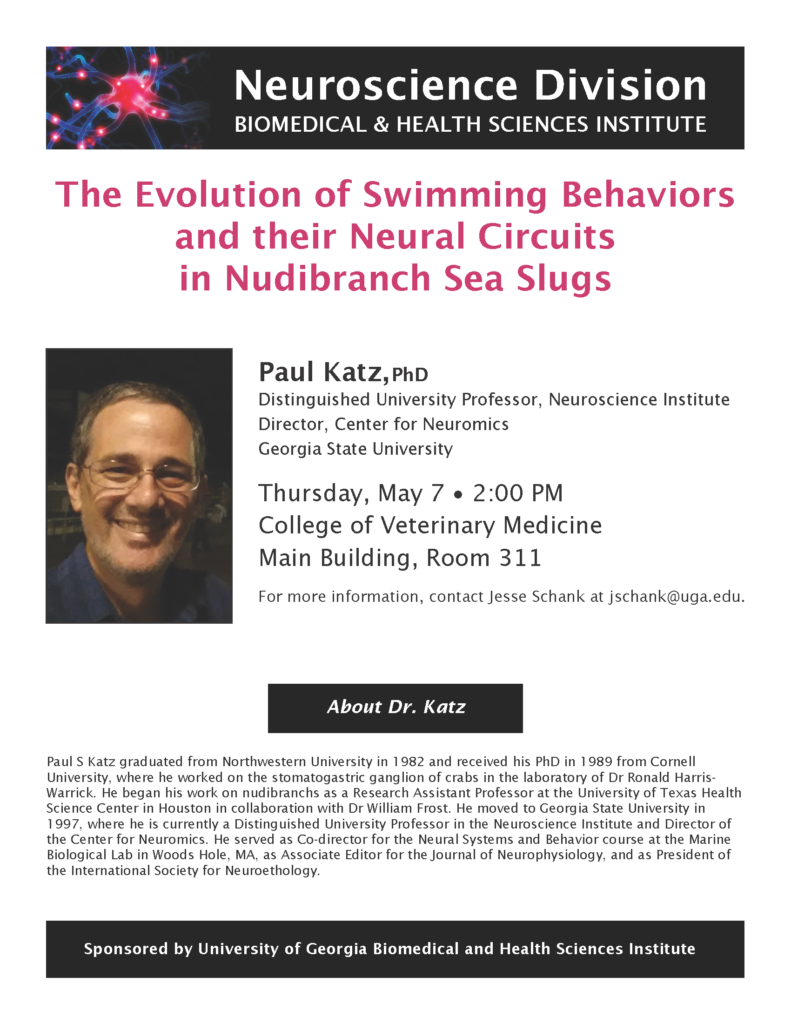
Angiogenesis as a target for recovery after stroke
Susan C. Fagan, Pharm.D, BCPS, FCCP
April 2, 2015
Coverdell Center
University of Georgia, Athens, GA
Dr. Susan Fagan has been a professor of pharmacy at the University of Georgia and adjunct professor of neurology at the Medical College of Georgia in Augusta, Georgia since 1999. In 2007, she became associate department head and assistant dean for the UGA pharmacy program at MCG. In August of 2008, Dr. Fagan was appointed Albert W. Jowdy Professor of Pharmacy Care.
Prior to her position at UGA, she spent 13 years on the faculty of Wayne State University and Henry Ford Hospital in Detroit, Michigan where she rose to rank of professor. She received her BSc in pharmacy from Dalhousie University in Halifax, Nova Scotia and her Doctor of Pharmacy degree from SUNY at Buffalo. She completed a two-year neuropharmacology fellowship at the Dent Neurologic Institute and SUNY at Buffalo. She has over 150 peer reviewed publications and is recognized nationally and internationally for her research
in stroke. In April, 2013, she was named Distinguished Research Professor at the University of Georgia (only the second named in the 100+ year history of the UGA College of Pharmacy) and assistant dean and founding director of the Center for Pharmacy and Experimental Therapeutics at the Medical College of Georgia. Her research is funded by both NIH and VA Merit Review.
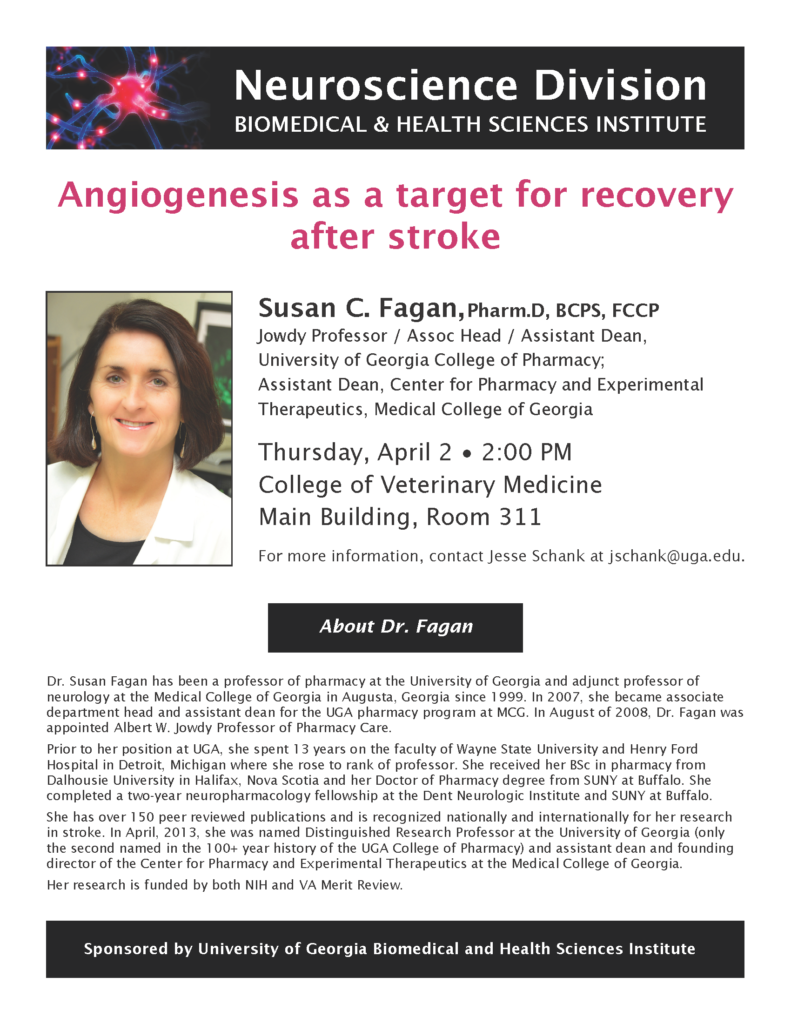
Reconceptualization of Psychosis Diagnosis via Brain-based Biomarkers
Brett Clementz, PhD
February 5, 2015
Coverdell Center
University of Georgia, Athens, GA
Understanding neural circuitries that support sensory processing as a function of context in both health and disease. This involves discerning how neural activities in a “controlled” system (e.g. sensory cortices) are influenced by a “controlling” system (e.g. prefrontal cortex). With EEG, MEG, and eye movement paradigms, this work investigates sensory registration, ability to bias sensory input given situational demands, attentional selection, and ability to appropriately manipulate sensory information to select context-appropriate responses. Primary focus is deviations in brain functioning associated with psychosis.
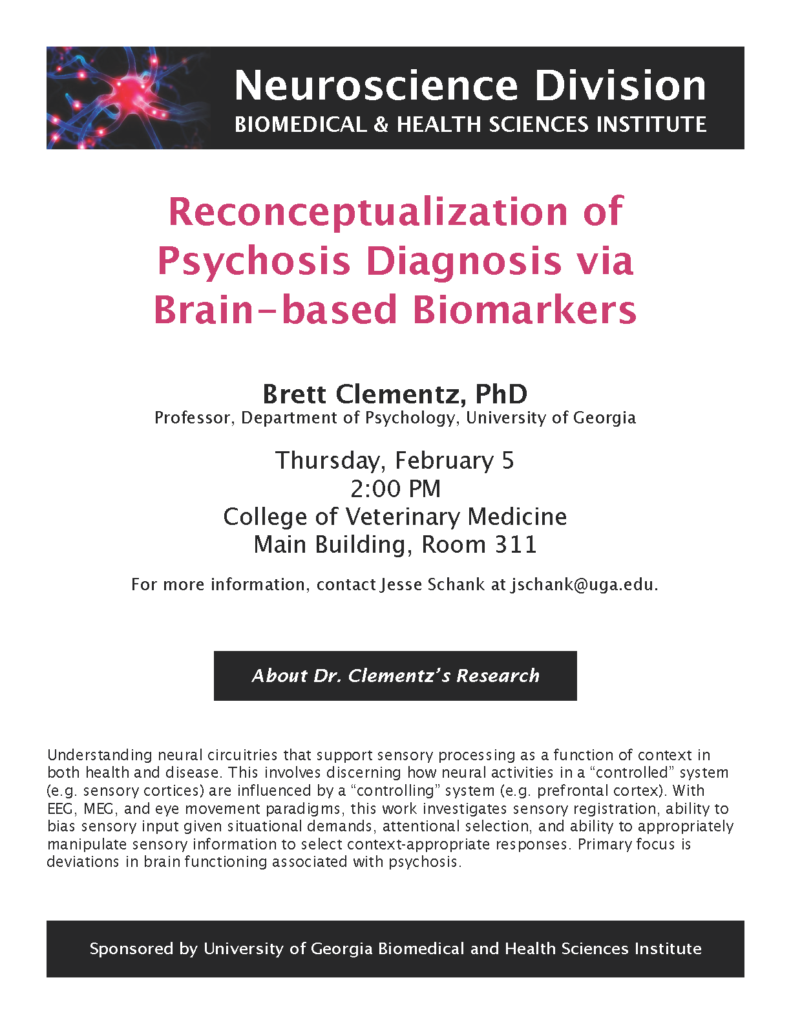
New Insights into Brain-Expressed? Orphan G Protein-Coupled Receptors
Randy Hall, PhD
March 5, 2015
Coverdell Center
University of Georgia, Athens, GA
Randy A. Hall, Ph.D., is a Professor of Pharmacology in the Emory University School of Medicine. Dr. Hall received his Bachelor’s degree in 1990 from the University of New Hampshire and attended graduate school at the University of California at Irvine, studying the regulation of ionotropic glutamate receptors under the direction of Gary Lynch. After obtaining his Ph.D. in 1994, Dr. Hall moved to the Vollum Institute in Portland, Oregon, to do a postdoctoral
fellowship in the laboratory of Thomas Soderling studying glutamate receptor trafficking and phosphorylation. In 1996, Dr. Hall continued his postdoctoral training at Duke University, where he studied the regulation of adrenergic receptors in the laboratory of Robert Lefkowitz. Dr. Hall joined the faculty at the Emory University School of Medicine in 1999. His laboratory’s research
focuses on signal transduction by neurotransmitter, hormone and sensory receptors. The list of awards that Dr. Hall has received includes the PhRMA New Investigator Award, the Distinguished Young Scholar in Medical Research award from the W.M. Keck Foundation and the John J. Abel Award from ASPET. Dr. Hall was recently named a Fellow of the AAAS.
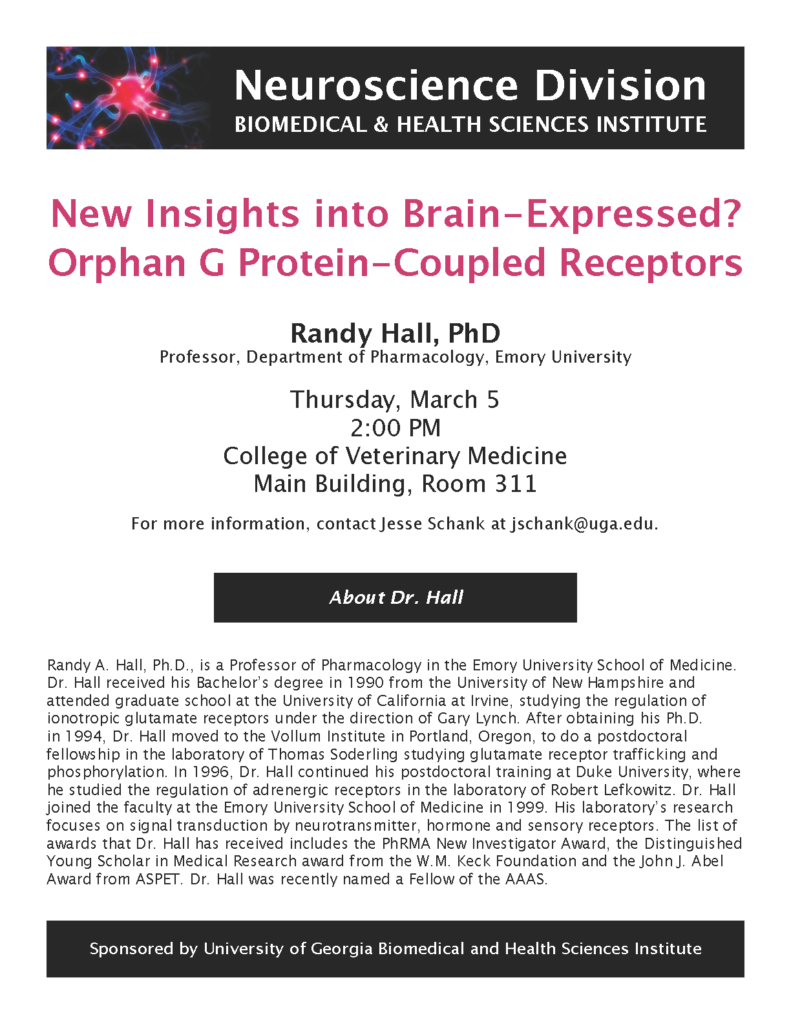
Behavioral Responses to Social Stress: Neurobiology of Winning and Losing
Kim L. Huhman, PhD
December 4, 2014
Coverdell Center
University of Georgia, Athens, GA
Kim Levy Huhman graduated from Duke University, where she double-majored in zoology and psychology. It was she became fascinated with the relationship of brain to behavior. She went on to the University of Georgia Biological Psychology program, where she received her Ph.D. in 1988 in the laboratory of Dr. Bradford N. Bunnell. After obtaining her degree, Dr. Huhman was a National Research Council Fellow at the Walter Reed Army Institute of Research in the Division of Behavioral Neuroendocrinology. She then moved to Georgia State
University in 1991 to do a second postdoctoral fellowship in behavioral neuroscience in the laboratory of Dr. Elliott Albers. She was funded during this time by a Ruth Kirschstein National Research Service Award. In 1995,
Dr. Huhman received independent funding for her research from the National Institutes of Health, and she transitioned into a faculty position.
Dr. Huhman is currently a Distinguished University Professor in the Neuroscience Institute and also holds an appointment in the Department of Psychology. She is the Past-President for the Atlanta Chapter of the Society
for Neuroscience, and she has served on a variety of study sections to review grants for the National Institutes of Health including serving as a regular member of the NNRS (Neuroendocrinology, Neuroimmunology and
Rhythms) Study Section. Dr. Huhman’s lab studies how brief exposure to social stress can alter brain circuitry to dramatically change future behavior.
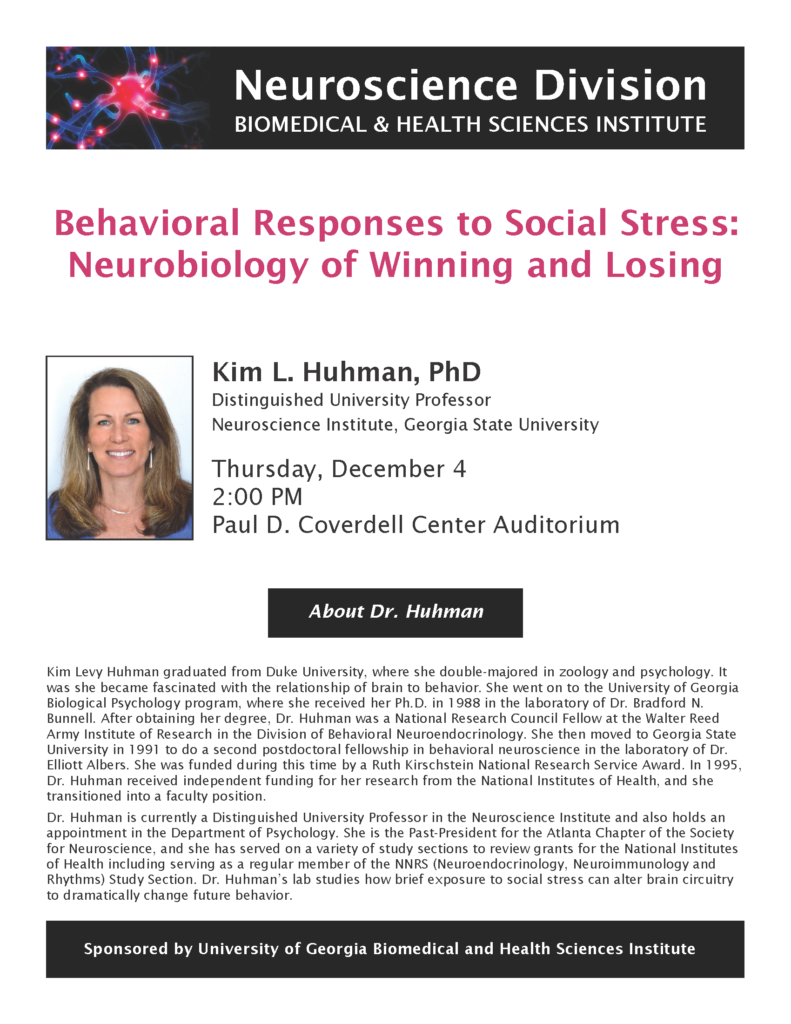
Central Processing of Olfactory Inputs for Appetitive Perception and Motivation in Drosophila
Ping Shen, PhD
November 10, 2014
Coverdell Center
University of Georgia, Athens, GA
Ping Shen’s research interest is to elucidate molecular and neural mechanisms underlying brain control of behavior and associated neurological disorders.
Genetically tractable Drosophila larvae have a highly evolved yet numerically simple nervous system. Using this experimentally amenable model, Shen and his team have discovered many conserved neural substrates and mechanisms that regulate complex behaviors such as reward-driven feeding of palatable food, hunger-driven food procurement and stress-induced social behavior.
One of his current research programs relates to a fundamental question in neuroscience: how environmental stimuli are sensed, perceived and converted to motivations and behaviors. Specifically, his lab is investigating how homogeneous and heterogeneous odor mixtures are centrally processed and the role of the conserved dopamine/neuropeptide Y-like signaling system in extracting appetitive information from complex olfactory inputs and converting it to reward-seeking motivation.
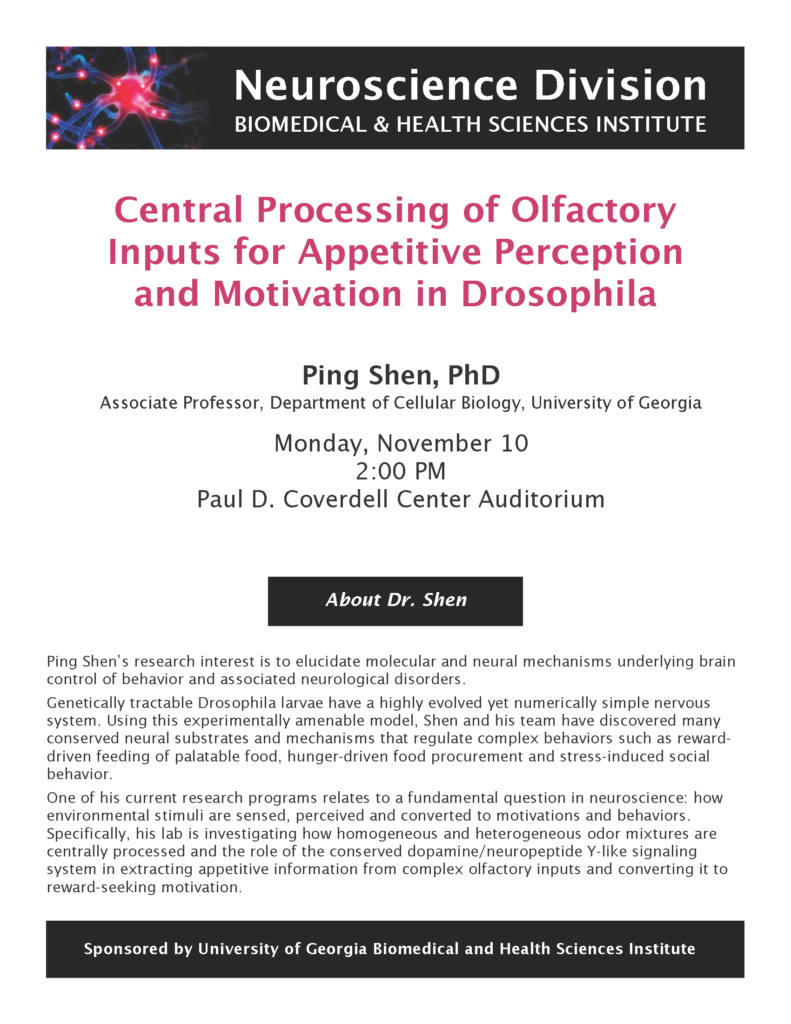
Neuro-immune interactions after traumatic brain injury: a role in the development of neurovascular injury
Krishnan M. Dhandapani
October 2, 2014
Coverdell Center
University of Georgia, Athens, GA
Krishnan Dhandapani received his B.S. And M.S. In Physiology and Neurobiology from the University of Connecticut. He obtained his Ph.D.in Molecular Medicine from the Medical College of Georgia, studying with Darrell Brann on the mechanisms of estrogen-mediated neuroprotection after stroke. He performed a post-doctoral fellowship in Neuroinflammation at the University of Connecticut Health Center under the direction of Sandra Hewett. Dr.
Dhandapani was recruited as Assistant Professor in the Department of Neurosurgery and Co-Director of the Neurovascular Research Laboratory at the Medical College of Georgia in 2005. Since 2010, he has served as Associate Professor. Dr. Dhandapani’s translational research program is focused on identifying mechanisms of neurological injury after traumatic brain injury and hemorrhagic stroke and has been supported by grants from NIH, American Heart Association, and the Department of Defense.
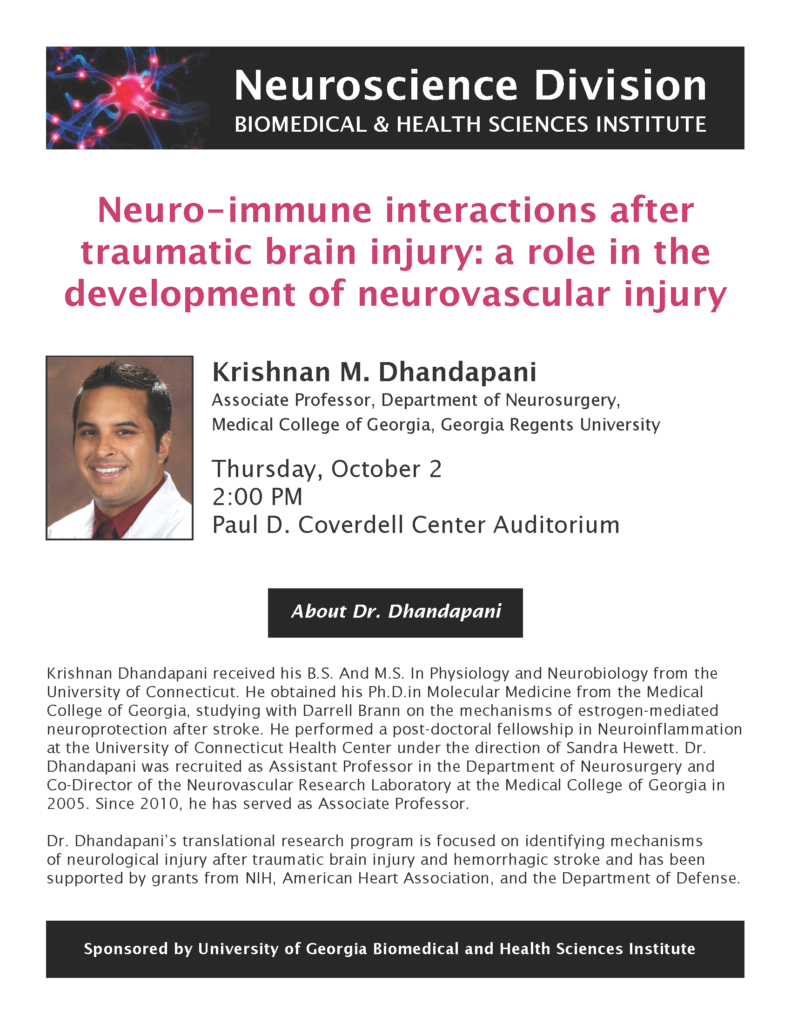
Multicopy RNA Genes & Their Role in the CNS
Susan L. Ackerman, PhD
June 11, 2014
Coverdell Center
University of Georgia, Athens, GA
Susan Ackerman’s pioneering investigation of neurodegeneration draws on her training in classical genetics, molecular biology, and behavior. Ackerman is exploiting the power of mouse genetics to provide a whole new view of the molecular and genetic mechanisms of neurodegeneration, such as that underlying Alzheimer’s disease, Parkinson’s disease, and motor neuron disease.
Taking advantage of the tremendous diversity of mutant mice available at the Jackson Laboratory where she works, Ackerman begins her studies by identifying mutant mice with interesting neurological phenotypes. She then works to identify the mutated genes responsible for those phenotypes, and has used this strategy to reveal several genes with critical roles in neuron protection and destruction in the aging central nervous system. Using the tools of cell and molecular biology and her knowledge of neuroanatomy, Ackerman probes deeper, yielding a clearer picture of how the products of those genes contribute to the development and maintenance of a healthy nervous system.
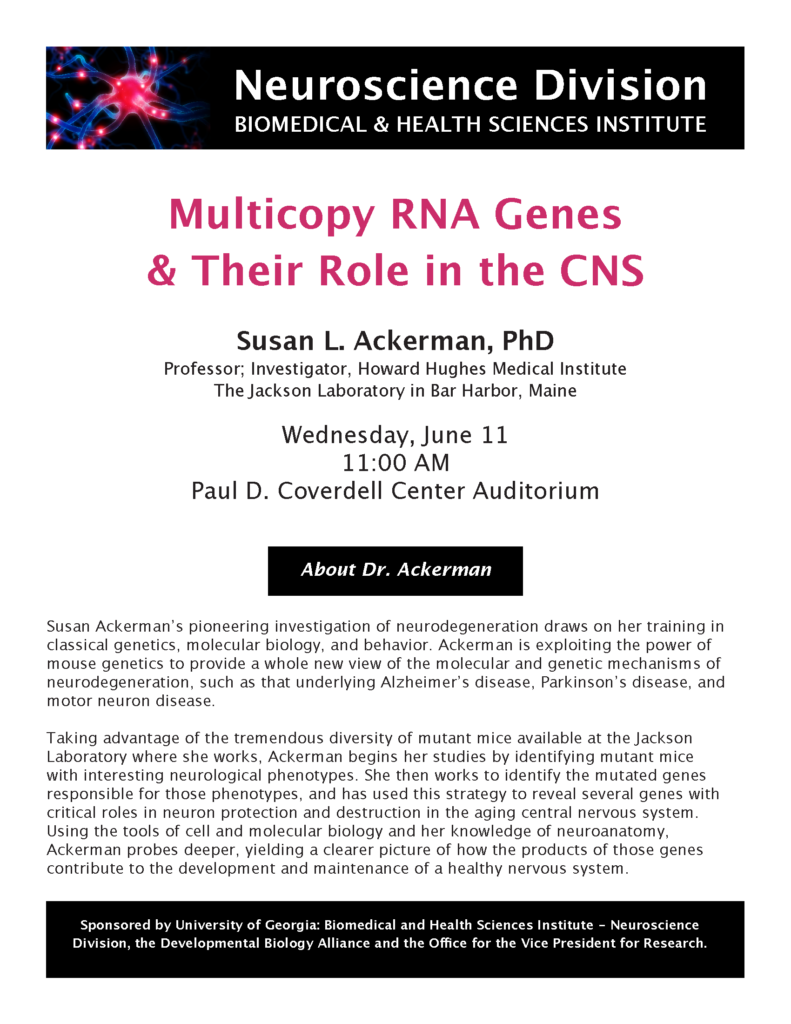
2012 Neuroscience Spring Symposium
April 20, 2012
Coverdell Center
University of Georgia, Athens, GA
The Neuroscience Student Association and the Biomedical and Health Sciences Institute’s Neuroscience Ph.D. Program hosted the 2012 Neuroscience Spring Symposium on April 20.
The symposium aimed to showcase the nature and scope of student and faculty research in the field, which currently spans 15 departments in six schools and colleges across campus.
Guest speaker Shelley Hooks, associate professor of pharmaceutical and biomedical sciences in the College of Pharmacy, discussed her work examining the molecular mechanisms by which bioactive lipid signaling pathways regulate early neural development.
A round of “Data Blitz” oral presentations followed. Participants in this event provided a brief presentation of their current research.

